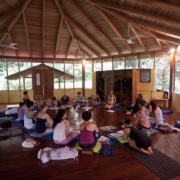Top 11 Tips on Dealing with Loneliness
We all experience loneliness at some point in our lives — maybe you just moved to a new neighbourhood, you’re under quarantine, or you’re breaking up with your lover. People of all ages can get lonely, not just the elderly. In fact, according to the Signa loneliness’ survey, people between 18 and 22 are lonelier than any other population. This is the generation that spends most of their time on the phone, and you’d think they are satiated and never alone.
Tchiki Davis – the author of Outsmart Your Smartphone: Conscious Tech Habits for Finding Happiness, Balance, and Connection IRL, found that the more you spend time online, the more you feel disconnected. It’s, therefore, understandable why generation Z is the lonelier than any other group.
What Loneliness Can Do to a Person
A licensed marriage and family therapist in California, Lisa Bahar, claims that loneliness is a feeling everyone goes through at some point in their lives. But when loneliness becomes chronic, it poses a danger to your health. In a study in Perspectives in Psychological Science, loneliness may cause depression, decreased immune system, stroke, early death, and alcoholism.
How to Deal with Loneliness
Whenever you anticipate the feeling of loneliness or you’re reminded of being alone, you feel abandoned and distressed. And you don’t have to be alone either – loneliness can crop up after making love to your partner or even when you’re in a crowd.
Here are some tips to help you deal with loneliness.
- Recognize loneliness is a Feeling Not a Fact
Loneliness occurs when the feeling triggers your memory. Your brain is wired to pay attention to danger and pain, including any painful and scary feelings. So, when you’re lonely, your mind alerts you about it. You start coming up with demoralizing theories. You may as yourself: am I a loser? Does anybody love me? Why am I feeling disconnected? The truth is, your brain is trying to figure out why you’re feeling lonely, and it doesn’t necessarily mean that your theories are true.
- Remember you’re not alone
You might feel alone even when your social life is thriving, amongst a huge group, or literally alone in the house. Understand, though, that you’re not alone, as many people in the world are going through the phase too. In fact, 40% of all populations are lonely at a particular time. People rarely share their experiences, but they, too, have a fair share in solitude. Recognizing that other people are also feeling alone gives you solace, and you can be able to move forward.
- Find the effects of loneliness so that you combat them
Surprisingly, you can feel loneliness physically. Studies show that loneliness can make you feel colder than those around you. Also, it increases your blood pressure and cholesterol and deters your immune system from functioning appropriately. Loneliness puts your body in high alert mode and leads you to self-destructive activities such as drug use, gambling, and others. Treating solitude helps you prevent these other self-destructive activities, as loneliness is a sign of a bigger problem.
What is the Cure for Loneliness?
- Get a pet
A pet comes with many advantages, the main one being companionship. A pet — especially a dog or a cat — can engage you, so much that you don’t have to feel lonely anymore. When caring for your pet, you keep your mind occupied, and you avoid thinking of loneliness. Besides providing you with unconditional love, pets help you connect with other pet lovers.
- Occupy yourself with fun hobbies
Loneliness can affect your mental health. You, therefore, need healthy distractions to improve your mental health. Here are some ideas.
Read
- Reread those books you read in your childhood
- Read books with a specific theme example, a place you’ve wanted to visit or have visited
- Read poetry books
- Listen to audiobooks
- Read magazines
- Enroll in online book clubs
Listen to music
- Create a playlist of happy music and listen each time you feel lonely.
- Find those songs you listened to during your teenage years.
- Play the piano, guitar, or any other instrument.
Watch movies and other videos
- Watch TED talks on YouTube
- Watch fun tv shows to relieve stress
- Listen to a podcast on a topic you like
- Learn When to Switch off Your Online Life
Deciding on whether to log in or off depends on the reason why you’re online in the first place.
- The online world is a place to connect with people.
Dating sites, multiplayer games, chat, and messaging platforms allow you to connect with other people, helping you fight off loneliness and self-isolation.
Social Media And LonelinessMost social media users portray exciting and expensive lifestyles, with supportive friends by their side. But this is, however, an exaggeration of their reality. Unaware of this, you might feel inadequate, alone, or left out, and your health might deteriorate in the long run. If being online makes you feel disconnected, log off.
- Volunteer Your Time and Energy
Working alongside other people for a good cause can improve your mental health. Volunteer activities reduce depression and stress, and help you bond with other people. Ideally, you feel contented when you engage in volunteer activities, working with like-minded for a common goal. Here are some ideas you can try.
- Find soup kitchen and take up some responsibilities
- Help kids in a children’s hospital
- Read to kids
- Work in an animal shelter
- Help in a nursing home or visit seniors
Participating in volunteer activities, especially in your neighbourhood, gives you a chance to make new friends. You’ll, probably, come across these friends in grocery stores, churches, and restaurants, and get more opportunities for social interaction.
- Exercise Self-Care
Another way to cope with loneliness is by exercising self-care routines. Self-care is critical if you’re looking to combat loneliness. Here are the things to incorporate in your self-care routine.
Exercise: Studies show that exercising triggers endorphins – happy hormones – a substance known to elevate mood and make you feel better about yourself. We are big advocates of yoga.
Quality sleep: Low-quality sleep or lack of sleep may lead to feeling lonely and isolated. So, if you’re fighting solitude, practice good quality sleeping habits. Avoid caffeine and sugar several hours before bedtime and ensure your bedroom is quiet and dark to facilitate quality sleep.
Get some sun: Sunlight, just like exercise, is known to improve how you feel. It triggers endorphins and serotonin – hormones responsible for feeling good. In return, you’re able to fight lonesomeness. Take measures such as wearing sunscreen before you go out to the sun.
Eat healthily: Eating a balanced diet is part of self-care. Avoid processed food, high sugar foods, and preservatives as they affect your physical and mental health. Considering solitude is a mental feeling, you need to care for your mental health to fight loneliness.
- Seek Professional Aid
When it gets to a point where you can’t tell whether you’re suffering from depression or loneliness, it’s essential you seek professional help. Talking to a mental expert will help you identify what’s causing your solitude. You can then work to eliminate things that lead to loneliness.
If, however, you can’t access a therapist, find an online platform. The best thing about online platforms is that they give you access to help from wherever you are, as long as you have the internet. These platforms are more affordable than real-time counseling.
- Exercise Positive Self-Talk
Why should you take a beating to your self-esteem? Often when you feel lonely, you think negatively and assume that no one wants to spend time with you. You end up hating your life. Identify these negative thoughts and replace them with positive ones. Adopting positive thinking might take a long time, but helps you prevent solitude in the future. If you seek therapy, your therapist will teach you how to practice positive self-talk techniques.
- Nurture Your Existing Friendship
Lonesomeness can make you pull away from your friendships. When this happens, you also find it hard to make the first step to reconnect with your friends. Here are some tips.
- start small talks with neighbours
- schedule a call with some of your friends weekly
- invite a small group for lunch
- message those friends that moved from the neighbourhood on social media
Can You Really Die of Loneliness?
Loneliness by itself cannot cause death. What you do when you’re lonely, however, may lead to death. If, for instance, you engage in drugs, gambling, and other destructive things, you may end up having suicidal thoughts. Solitude also affects your mental health, and that includes depression. Depression may sometimes lead to death. Take a depression test to find out whether you’re safe or you’ll need professional help.
There you have it, tips on how to cope with loneliness. Practice those that work best for you.











